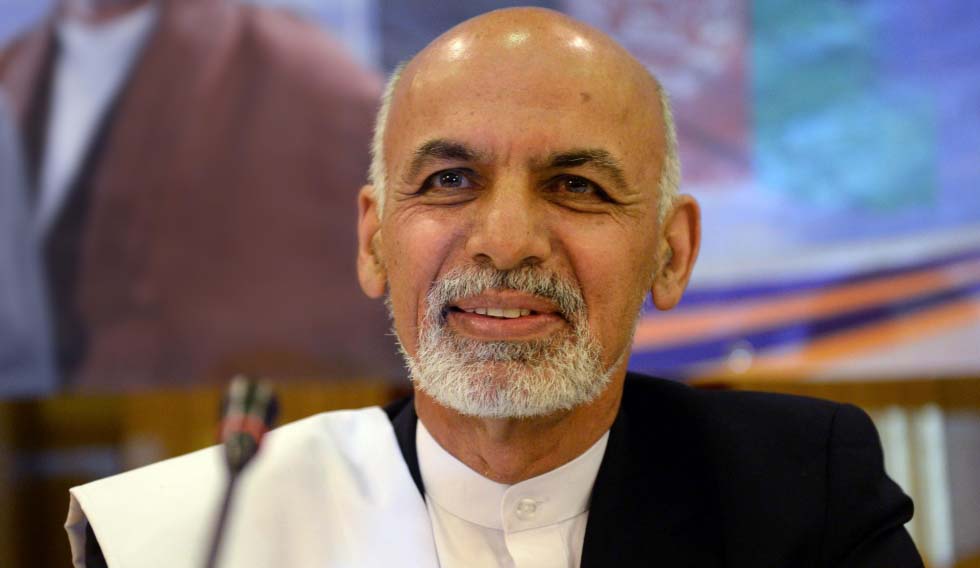President Ashraf Ghani has vowed to shift 80 percent of country's international trade with Europe towards the new route that passes through Central Asian states and Turkey
KABUL - Afghanistan has long complained about persistent delays in shipments via Iran and Pakistan caused by political rifts and alleged maneuvers by these powerful neighbors to safeguard their own trade interests in the war-torn country.
President Ghani, who has served at the World Bank and co-authored a globally acclaimed book on rebuilding broken states, promised his countrymen during his latest public address that he would achieve the said target within his term in office.
“God willing, within three years from now, the Azure Route will link us to the continent of Europe via the Central Asian States and Turkey,” the president said.
The route is named after a precious gemstone found in Afghanistan.
In a clear reference to Iran and Pakistan, who have traditionally enjoyed full control over Afghanistan’s global trade, Ghani said neighbors should not feel threatened by this move. “This creates an opening for them as well,” he said.
There is already a significant decline in trade via Pakistan. According to the Afghanistan Chamber of Commerce and Industry, this route has seen a 40 percent decline in trade. Similarly, a significant amount of trade with Iran has moved to the Central Asian states and Turkey.
For Afghan traders such as Muhammad Jawed, new avenues for trade are not a luxury anymore -- but a necessity. The 45-year old businessman, who is based in the capital Kabul, imports electronics from Europe.
“We have had very tough days with the Karachi port in Pakistan,” he said, adding that abrupt and unforeseen delays in shipments in Pakistan, especially of fresh goods, have cost Afghan traders millions of dollars.
Afghanistan’s economy heavily relies on foreign aid to stay afloat. During the past decade though, the economy saw unprecedented double-digit growth but that was largely fueled by the significant foreign military and civilian presence.
According to the US Geological Survey, the country holds up to $3 trillion in proven untapped mineral deposits, which could make it one of the richest mining regions on earth. However, due to the conflicts, it remains one of the least developed countries in the world, ranking 175th on the United Nations' Human Development Index.
Experts argue there is a long way ahead to realize the dream of mineral wealth and that the current bubble economy could burst at any time if a parallel structure of self-reliance is not erected soon.
A bubble economy is a booming, but unsustainable, financial situation.
In eyes of the former finance minister Abdul Hadi Arghandiwal, alternate trade routes are of important in this regard.
“We have often been blackmailed and pressured by our neighbors," he told the AA.
In various capitals of the world, there have been extensive talks and planning about the revival of the Silk Route, as well as linking Afghanistan with the Chabahar port in Iran via rail network. China and India have been instrumental in this regard.
The Silk Route was an ancient trade route between China and the Mediterranean Sea which linked the regions of the ancient world in commerce.
Arghandiwal said that the idea of a new trade corridor passing through the Central Asian states would need far less infrastructure development than the revival of the Silk Route.
“Afghanistan has already been doing trade with most of the Central Asian states, we just need to devise a comprehensive strategy and sign transit treaties with them,” the former finance minister said.
Sources close to Ghani told the AA that the Afghan government has also asked Beijing to help connect both countries via a land route in the northern Wakhan corridor. (Monitoring Desk)
“Previously the Chinese were reluctant due to fears that religious militants might exploit this link to destabilize its restive Xinjian province, but now they are willing to do so,” said the official.
He also said discussions regarding this issue took place between Ashraf Ghani and Chinese officials during the Afghan President’s maiden visit to China last October.
President Ghani, who completed his first 100 days in office this week, said he would now cautiously be monitoring economic affairs after completing his first two major tasks: the peaceful transfer of power from one elected president to another and obtaining security responsibilities from NATO forces. (Monitoring Desk)

